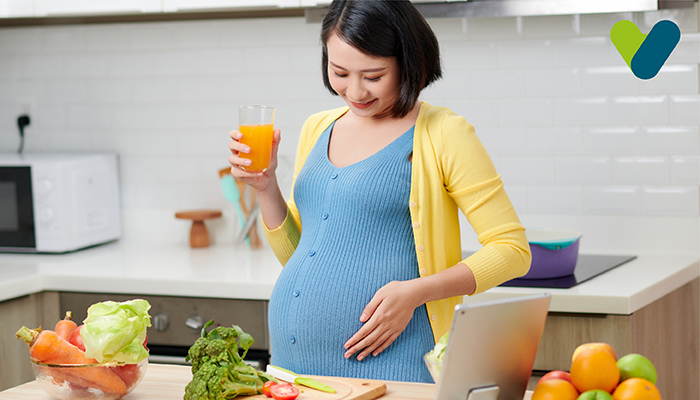Each day, about 300 additional calories are required to support a healthy pregnancy. Protein, fruits, vegetables, and whole grains should all be part of a well-balanced diet. Sweets and fats should be eaten in moderation. Some pregnancy symptoms, such as nausea and constipation, can be alleviated by eating a nutritious, well-balanced diet. Preconception nutrition is an important aspect of getting ready for a pregnancy. Factors like your weight in relation to your height and what you eat can have a big impact on your pregnancy health and the health of your kid.
Foods to Eat During Pregnancy
The following foods are good for your health and the growth of your fetus when you're pregnant:- Carrots, sweet potatoes, pumpkin, spinach, cooked greens, tomatoes, and red sweet peppers are examples of vegetables (for vitamin A and potassium).
- Cantaloupe, honeydew, mangoes, prunes, bananas, apricots, oranges, and red or pink grapefruit are some of the fruits available (for potassium).
- Dairy products include fat-free or low-fat yogurt, skim or 1% milk, and soymilk (for calcium, potassium, vitamins A and D).
- Ready-to-eat cereals and prepared cereals are examples of grains (for iron and folic acid).
- Protein sources include beans, peas, nuts, and seeds.
Fluid Intake During Pregnancy
The importance of fluid consumption in pregnancy nutrition cannot be overstated. In addition to the fluids in juices and soups, you can get adequate fluids by drinking several glasses of water each day. Limiting your intake of coffee and artificial sweeteners is something you should discuss with your doctor or midwife. Alcohol should be avoided in any form.Importance of Iron
Iron helps in the formation of hemoglobin, which transports oxygen throughout the body. Maintaining good skin, hair, and nails is also crucial. Women of reproductive age require more than twice the amount of iron as men, due to the amount of blood lost during menstruation, and considerably more during pregnancy and lactation. Iron deficiency anemia is the most frequent deficiency in women since many of us don't receive nearly enough iron in our diets. Even light physical work can deplete your vitality, leaving you feeling weak, weary, and out of breath. Iron deficiency can also affect your mood, generating depression-like symptoms including irritability and concentration problems. While a simple blood test can inform your doctor if you have an iron deficiency, it's a good idea to check the amount of iron in your diet if you're constantly fatigued and cranky.Importance for Calcium
Calcium is required for a variety of tasks, including the growth of healthy bones and teeth, the maintenance of bone and tooth strength as you age, the regulation of heart rhythm, and the proper functioning of the nervous system. Irritability, anxiety, depression, and sleep disorders can all be caused by calcium deficiency. If you don't eat enough calcium, your body will draw calcium from your bones to maintain normal cell function, which can result in weakening bones or osteoporosis. Because women are more likely than males to develop osteoporosis, it's critical to obtain enough calcium, as well as magnesium and vitamin D, to support your bone health.Importance of folate (vitamin B9)
Folate, or vitamin B9 (also known as folic acid when used in fortified foods or as a supplement), is another essential that many women are deficient in. When consumed before conception and during the first few weeks of pregnancy, folate can dramatically lower the risk of neurological birth abnormalities. Folate can also lessen a woman's risk of heart disease and certain types of cancer, so it's an important nutrient for all women of childbearing age, even if they don't plan on getting pregnant (and many pregnancies are unplanned). Folate can help your body produce estrogen during menopause later in life. A lack of folate in your diet can affect your mood, making you irritated and tired, affecting your focus, and making you more susceptible to anxiety and headaches.Exercise for pregnant women
Moderate exercise is not only safe for pregnant women but it's also recommended and thought to help both you and your developing child. Aim for at least 150 minutes of moderate-intensity aerobic activity every week. However, before beginning any exercise plan, speak with your doctor, especially if you have any risk concerns. If you weren't physically active before getting pregnant, talk to your doctor about what kind of safe activity you can do while you're expecting. Walking, light jogging, and swimming are examples of aerobic workouts that stimulate the heart and lungs, as well as muscle and joint movement, all of which aid in the processing and utilization of oxygen. Many fitness sessions are specifically developed for pregnant women to help them increase strength, improve posture and alignment, and improve circulation and respiration.Good food hygiene for pregnant women
- Before and after making meals, always wash your hands.
- Keep the surfaces in your kitchen clean.
- Allowing uncooked food to contaminate cooked meals is not a good idea.
- Before eating, wash all fruits, vegetables, and salads.
- Make sure the food is completely cooked.
- Pets should be kept away from kitchen surfaces.
- When handling cat litter pans or gardening, wear rubber gloves.
- Keep food at the proper temperature.
